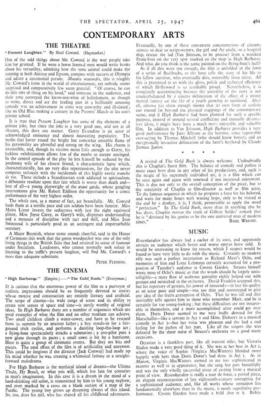THE CINEMA
IT is curious that the enormous power of the film as a purveyor of realistic impressions should be so frequently devoted to stories whose motive and construction are entirely literary and artificial. The scope of cinema—its wide range of scene and its ability to create new senses of space and time—is surely worthy of original ideas. In High Barbaree there are a number of sequences which are good examples of what the film and no other medium can achieve. Two small children climb a water-tower, and have to be rescued from its summit by an anxious father ; a boy stands-in for a fair- ground trick cyclist, and performs a dazzling loop-the-loop act ; a flying-boat spectacularly attacks a submarine ; a test-pilot puts a new plane through its paces ; a small town is hit by a hurricane. Here is quite a group of cinematic events. But they are bits and pieces. The total effect of the film is of artificiality and unreason. This could be forgiven if the director (Jack Conway) had made up his mind whether he was creating a whimsical fantasy or a straight- forward melodrama.
For High Barbaree is the mythical island of dreams—the Ultima Thule, Hy Brasil, or what you will, which has lain for centuries in man's imagination. In this case it is a dream in the mind of a hard-drinking old sailor, is transmitted by him to his young nephew, and even marked by a cross on a blank section of a map of the Pacific. The young boy grows up dreaming always of this island. So. too, does his girl, who has shared all his childhood adventures. Eventually, by one of those convenient concatenations of circum- stances so dear to script-writers, the girl and the uncle, on a hospital ship, rescue the lad (Van Johnson, to be precise) from a wrecked flying-boat on the very spot marked on the map as High Barbaree. And what do you think is the name painted on the flying-boat's hull?
As if all this were not enough, the film is unfolded in the form of a series of flashbacks, as the hero tells the story of his life to his fellow survivor, who eventually dies, ostensibly from thirst. All this is presented to us with the gloss, polish and technical efficiency of which Hollywood is so justifiably proud. Nevertheless, it is completely unconvincing because the unreality of the story is not counterbalanced by a sincere -delineation of the effect of a strong mental fantasy on the life of a youth growing to manhood. After all, cinema has often enough shown that own form of realism can extend far beyond the physical trappings of the contemporary scene, and if High Barbaree had been planned for such a specific purpose, instead of around several conflicting and mutually destruc- tive ideas, it might have been a much more enjoyable and valuable film. In addition to Van Johnson, High Barbaree provides a very good performance by June Allyson as the heroine, some regrettable over-acting by Thomas Mitchell (who should know better), and an exceptionally attractive delineation of the hero's boyhood by Claude Jarman Junior.
A revival of The Gold Rush is always welcome. Undoubtedly this is Chaplin's finest film. The balance of comedy and pathos is more exact here than in any other of his productions, and, such is the magic of his supremely individual art, it is a film which can be seen again and again with renewed if not increased enjoyment. This is due not only to the overall conception of the piece, but to the sensitivity of Chaplin as film-director as well as film actor, To the famous sequence in which he prepares a feast for his beloved, and waits for many hours with waning hope, only to be visited at the end by a donkey, it is, I think, permissible to apply the word " perfection." In The Gold Rush, more than in anything else he has done, Chaplin proves the truth of Gilbert Seldes' remark that he is " destined by his genius to be the one universal man of modern


































 Previous page
Previous page